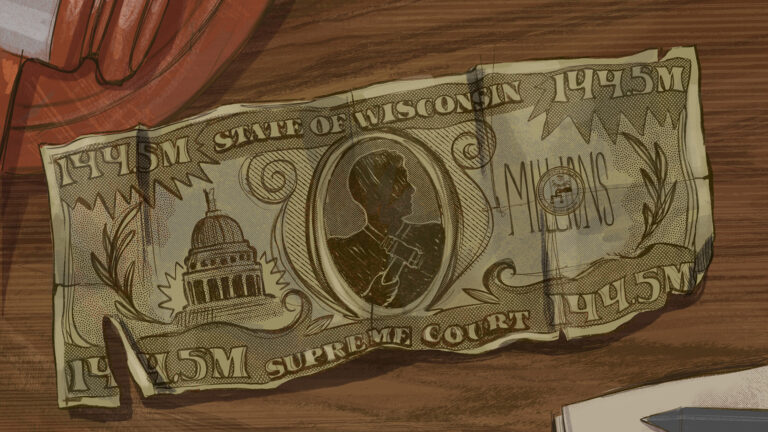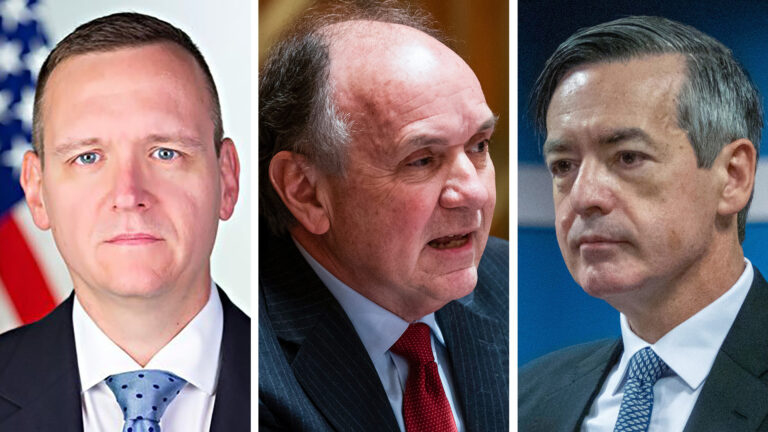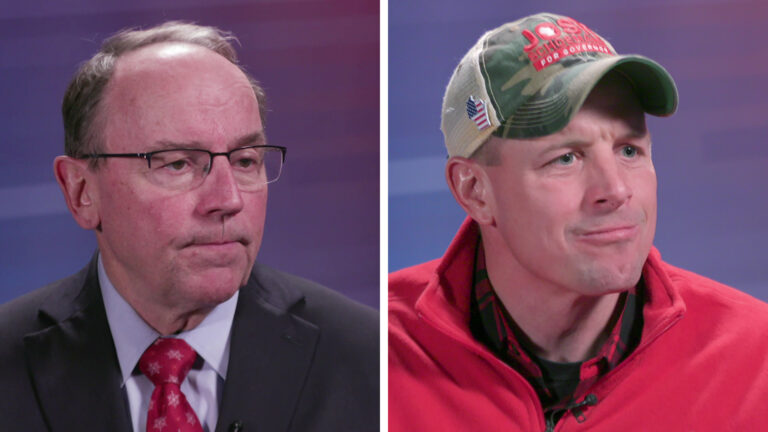Frederica Freyberg:
As horrifying as it is to watch the human carnage of war in Ukraine from afar, for people who call Ukraine home, it’s unspeakable. Our next guest, a Ukraine native and Wisconsin transplant, worries for her family there. But she considers all Ukrainians her family, and the atrocities are taking their toll. Ruslana Westerlund joins us from her home in Cross Plains, Wisconsin. Thanks very much for joining us.
Ruslana Westerlund:
You’re welcome. I’m glad to be here.
Frederica Freyberg:
So what is your reaction when you see the continued brutality against Ukraine and its people?
Ruslana Westerlund:
You know, I thought I would — it would get easier, but it’s absolutely heart-wrenching because the atrocity continues and the civilians are attacked and bombed and maternity wards are attacked and children’s hospitals are targeted and bombed, and now the war just becomes just painful and impossible to make sense of or wrap your head around.
Frederica Freyberg:
How do you even deal with it, seeing that, and knowing that your family remains in Ukraine?
Ruslana Westerlund:
I try to seek support, and I have received a lot of support. And I try to stay in touch with my family in Ukraine, and to either encourage them or to just check in on how they’re doing, and constant communication, just organizing rallies in Madison and feeling the solidarity and feeling the support of people helps to get through day to day or sometimes hour by hour.
Frederica Freyberg:
Where are members of your family now, and what is happening to them?
Ruslana Westerlund:
So my dad and my stepmom, my uncles and aunts, the majority of them live in central Ukraine, and they do live in fear, even though they don’t have to go in the bomb shelters yet, because relatively that area has been left untouched, but it’s still — there is still a lot of fear. So they’re in central Ukraine, and some of my nephews are in — some of my relatives are in western Ukraine.
Frederica Freyberg:
So I have read that you didn’t expect Putin to actually invade Ukraine. Why not?
Ruslana Westerlund:
I think it was just hard to believe that he would actually do it. I mean, we knew the war in the east has been going on since 2014 and the annexation of Crimea, so we thought maybe he’ll be continuing those efforts because he’s got an agenda there. So it was just — the invasion of the entire country was a shock to all of us.
Frederica Freyberg:
And the continued brutality of it, what about that? Still shocking, I imagine.
Ruslana Westerlund:
It’s — it’s — sometimes I have no words. And I write poetry to process and I wrote a poem but there are no words especially when the humanitarian corridors are being mined, so evacuees cannot escape. And that’s actually a war crime, because civilians are supposed to be allowed to escape and evacuate. So when the humanitarian corridors are mined and blown up, then you’re looking at just atrocity and brutality and extermination of people.
Frederica Freyberg:
What would you like to see the U.S. do to help Ukraine fend off the Russians?
Ruslana Westerlund:
I would like the U.S. to come up with creative solutions that — because I understand involving NATO directly is not safe or maybe it isn’t’, I really don’t know, but if that’s not an option, then think of creative ways of how to supply the MiGs, the fighter jets by allowing and equipping the Ukrainian army to fight off the war with more equipment. The world has to step up and do something more.
Frederica Freyberg:
Does it surprise you that Ukraine has put up such a good fight?
Ruslana Westerlund:
No, because we are resilient people, we’re strong people, we’re independence-loving people. We have never been part of Russia, sort of like — spiritually speaking. We have been dragged into the Soviet Union, but we have always been independent people in our spirit. Since the — our history of the Kievan Rus’ centuries ago. So we have always been — we are kind of used to oppressors now. It’s sad, but because we have endured such brutality and oppression and the Holodomor, which was the artificial famine in ’33, we have developed resilience and strength to fight off because independence and our soil are the most important values to us.
Frederica Freyberg:
What do you think will happen in the end?
Ruslana Westerlund:
We will win. We will win. And I don’t care what happens to Russia. But Ukraine will win. It will cost us more lives and it’s — the unthinkable atrocities will continue because Putin won’t give up easily but we will win. We just need support, continued, continued global support to help us win.
Frederica Freyberg:
Ruslana Westerlund, thank you for joining us, and good luck to you and your family.
Ruslana Westerlund:
Thank you so much for having me.
Search Episodes
News Stories from PBS Wisconsin

Donate to sign up. Activate and sign in to Passport. It's that easy to help PBS Wisconsin serve your community through media that educates, inspires, and entertains.
Make your membership gift today
Only for new users: Activate Passport using your code or email address
Already a member?
Look up my account
Need some help? Go to FAQ or visit PBS Passport Help
Need help accessing PBS Wisconsin anywhere?

Online Access | Platform & Device Access | Cable or Satellite Access | Over-The-Air Access
Visit Access Guide
Need help accessing PBS Wisconsin anywhere?

Visit Our
Live TV Access Guide
Online AccessPlatform & Device Access
Cable or Satellite Access
Over-The-Air Access
Visit Access Guide
 Passport
Passport


















Follow Us